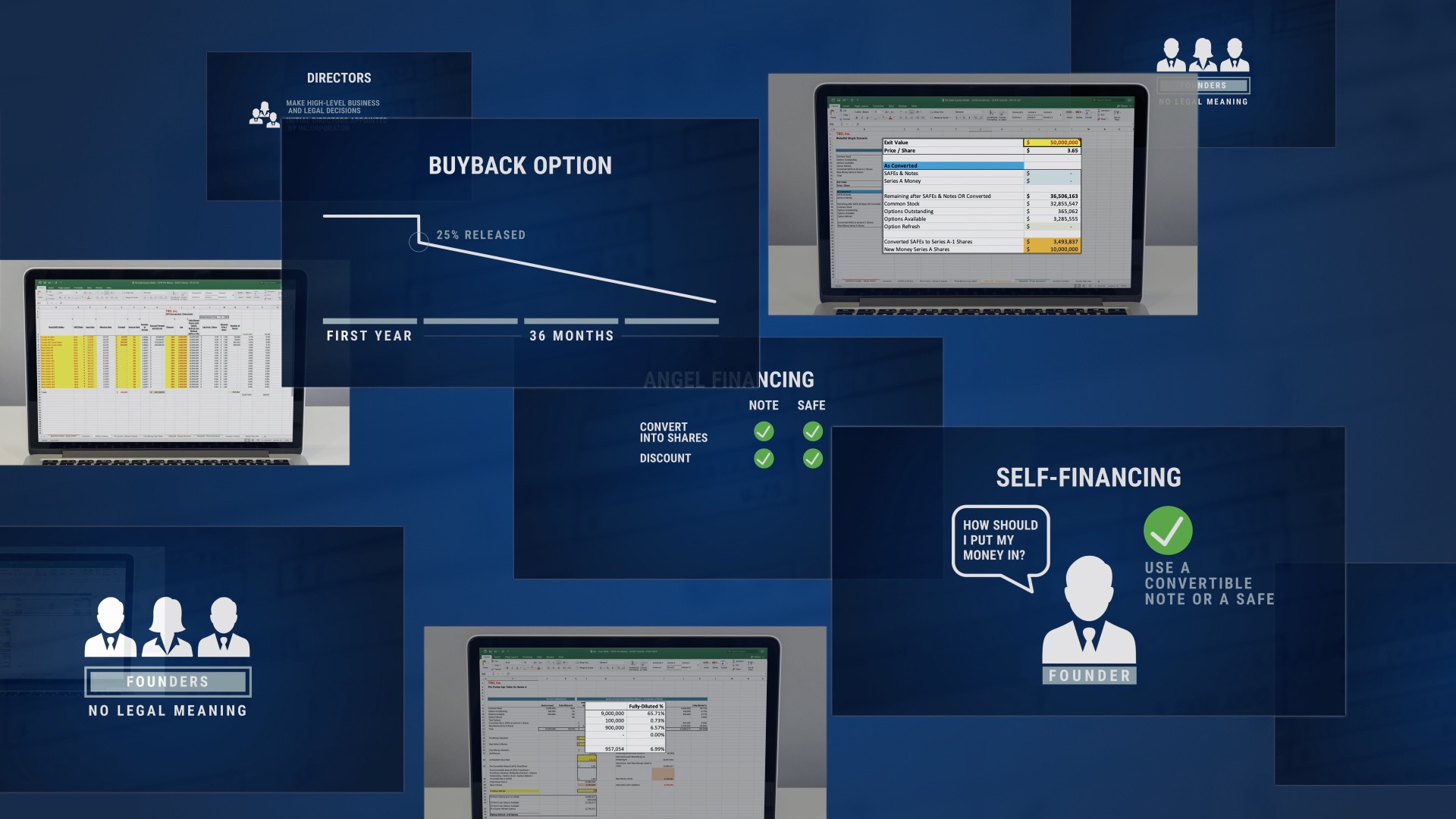When discussing intellectual property (IP) with founders, I get two very different questions from founders, and both questions have the same answer. The first question is, “This IP is my baby, can I keep it instead of giving it to the company?” The second is, “Can’t we worry about IP later?”
The answer to both questions is always “no” if you aspire to obtain venture capital investment to grow your company. Venture funds will take a hard pass on any startup that does not own or has not taken steps to protect its IP.
This all does not matter unless you know what IP is. For those of you who know what IP is, here is a refresher on what is IP. And for those of you do not, here is a quick summary.
Kinds of Intellectual Property Rights
There are four kinds of intellectual property rights: patents, copyrights, trademarks, and trade secrets.
Patents
Patents are probably what most people think of when they think of intellectual property rights because of all of the stories we have heard about Uncle Bob’s crazy invention that made him a millionaire. So, what is a patent?
A patent is an exclusive right to right to manufacture, sell, and market a novel invention for a set period of time. Getting a patent requires that you create a novel invention and that file an application for the patent with the U.S. Patent and Trademark Office (USPTO). Getting awarded a patent can take up to a year or longer, and can be quite expensive because of the significant legal and professional fees.
Before you file for a patent, it is good to know what it is. The USPTO lists the following as things that can be patented:
- Process
- Machine
- Article of manufacture
- Composition of matter
- Improvement of any of the above
The USPTO also lists the following as things as not patentable:
- Laws of nature
- Physical phenomena
- Abstract ideas
- Literary, dramatic, musical, and artistic works (these can be copyright protected)
- Inventions which are:
- Not useful (such as perpetual motion machines); or
- Offensive to public morality
As you may see, the list the USPTO provides is not very informative, which is one of the reasons why you should consider working with an attorney who specializes in the area to determine whether you should file a patent application. What’s more, even if your invention is capable of being patented, you have to prove to the USPTO the invention is novel (never before been invented) to obtain a patent. The battle doesn’t stop there either, because other patent holders may challenge the validity of your patent on numerous grounds.
Copyright
A copyright protects original works of authorship – including literary, musical, dramatic or artistic works, and other enumerated works. If you are a software startup, you might ask yourself, “Why should I care about copyrights?” You should care because the source code of your software is protected by copyright law.
Like a patent, a copyright owner has certain exclusive rights to work for a period of time. Those rights include the right to reproduce, display, copy, record, and publicly perform the work.
Unlike a patent, there is no requirement to file an application with the U.S. Copyright Office. A copyright exists the moment an author creates the original work and commits it to a tangible medium like paper or a computer file. However, registering the work with the U.S. Copyright Office makes a public record of the claim to the IP rights, and gives the owner additional protections under U.S. copyright law.
Trade Secrets
Trade secrets are often the most valuable type of intellectual property right because it exists for so long as it remains secret. Trade secrets involve IP such as the secret formula to Coca-Cola, or customer or user data code that a startup wouldn’t want a competitor – or any outside party – to see.
There is no registering or filing of documents for trade secrets; rather, it’s a legal status given to IP that, as the USPTO says:
- is information that has either actual or potential independent economic value by virtue of not being generally known,
- has value to others who cannot legitimately obtain the information, and
- is subject to reasonable efforts to maintain its secrecy
All three of these qualities must exist for the intellectual property to have trade secret status; if any one does not exist, trade secret status does not exist.
It is a business owner’s responsibility to secure trade secrets. Economic espionage laws protect companies from trade secret theft, and both criminal and civil cases can be brought in cases of trade secret theft.
Trademarks
Trademarks are used to protect names, logos, trade dress, colors and other markings that identify the source of goods or services.
To obtain rights in a trademark, the owner simply has to start using the trademark in commerce (i.e. the goods and services are currently available for sale or hire). Registration of a trademark with the USPTO is not necessary to obtain protection, but filing and application is recommended because it provides the owner greater rights and protections. A trademark gives the owner the exclusive right to manufacture, market and sell the goods or services using the mark. The exclusive right will exist so long as the owner is marketing and selling goods using the market, so the right can be in perpetuity.
Not all words, symbols, logos, and devices can be registered as trademarks. Also, it is important that when filing an application that you select the correct basis of the filing and properly describe the goods and services associated with the mark; otherwise, the trademark could be subject to cancellation by the USPTO or your competitor. For those reasons, it is strongly recommended that you hire an attorney who specializes in this area to help with filing an application with the USPTO..
Intellectual Property and Startups
As we mentioned at the outset, for venture backed startups, ensuring that the IP is owned by the company – and not a founder or an employee – is of critical importance. Intellectual property is the heart of an innovative startup, and if a founder or employee can leave and take the rights to essential IP with them, the company is, at best, crippled. At worst, it’s game over.
And that’s why venture capitalists will steer clear of any startup that hasn’t secured its intellectual property rights from its founders and employees.
So although it may seem you can put off transferring IP to the company because the costs may be expensive, the risk is far too great to not do it correctly and immediately.
How to get a Founder’s IP into the Company
For many startups, the notion of turning an idea into a business usually hinges on a piece of IP that one or more of the founders created, be it proof-of-concept code, a prototype or even a full-featured demo product. Guess who is the owner of that IP between the founder and the company? Well, by law, almost all IP is owned by the inventor, creator, or author, unless there is an agreement to the contrary. For that reason, it is really important that each founder commit to properly documenting and vesting ownership of the IP in the company. Here are two simple ways to ensure your startup owns all of the founders’ IP:
- For IP created before the company is formed: assign the IP to the company as part of what the founder pays for their stock in their stock purchase agreement. At incorporation, the founders can pay for their purchase by assigning all of the IP they created prior to the formation of the business. It is important to include an assignment agreement and properly identify the pre-formation IP created by the founder.
- For IP created after formation: the founder should sign a confidentiality invention assignment agreement. Every founder should sign a confidentiality and invention assignment agreement (CIAA) no matter what. CIAAs have terms and conditions that specifically vest ownership in all IP created by the founder while working for the company.
Employees and contractors also may bring intellectual property to a company, and their work can be transferred in similar fashion. For example, as compensation for transferring personal IP to the company, an employee may be given stock under a restricted stock grant agreement that includes a section addressing the transfer of the IP.
Learn the Right Way to Form Your Company and Manage Your IP
Transferring IP to the company is one of the many steps to properly forming your startup, and StartupProgram.com Academy can teach you how to launch a business that avoids all the pitfalls (IP-related or otherwise) along the way.
StartupProgram.com’s Professional Services, which provides formation services can help founders get their IP in the business with stock purchase agreements and invention assignment agreements. In addition to generating these documents, SUP pro services provides legal review of your formation plans via our partner company, O&A, P.C.







